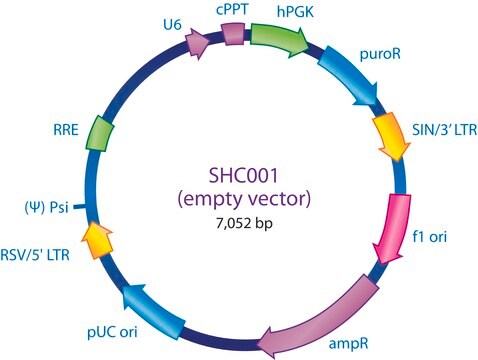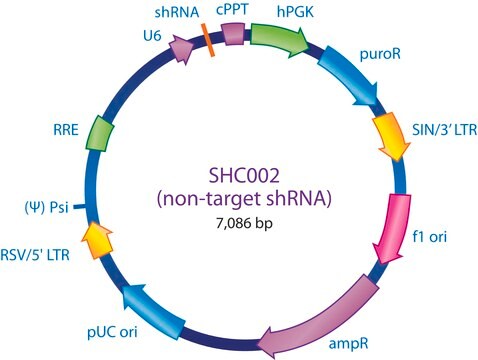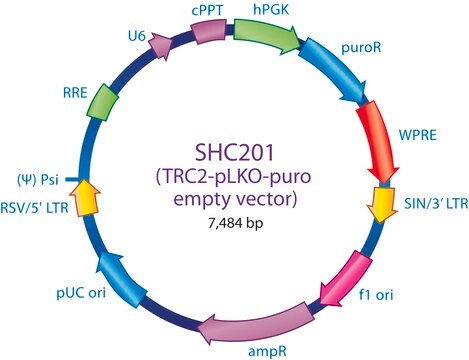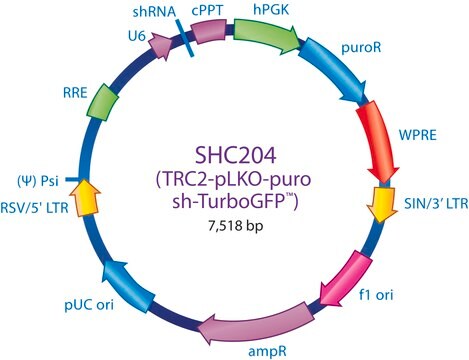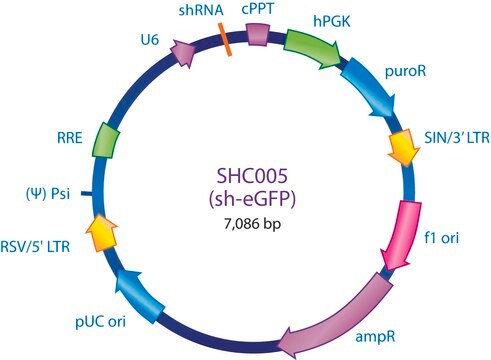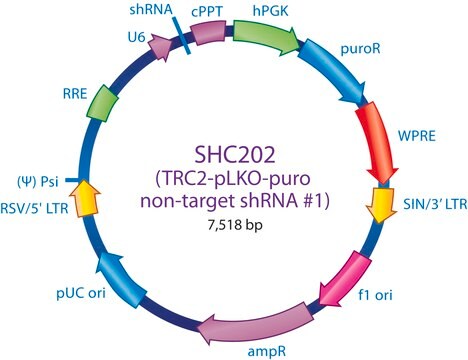SH1921
MISSION® shRNA Human Gene Family Set, DNA
Apoptosis Pathway
Se connecterpour consulter vos tarifs contractuels et ceux de votre entreprise/organisme
About This Item
Code UNSPSC :
41106609
Nomenclature NACRES :
NA.51
Produits recommandés
Vous recherchez des produits similaires ? Visite Guide de comparaison des produits
Catégories apparentées
Description générale
Sequenced-verified shRNA lentiviral plasmids (pLKO.1-puro) are provided as purified plasmid DNA suitable for virus production and transient transfection. DNA is provided in 40 μl aliquots per well in Tris,EDTA (TE) solution. An average of 2 μg per clone is provided per well with a range from 400 ng to 4 μg. The set comes in 96-well plates that are barcoded for simple identification. A CD containing RefSeq, gene description, gene symbol, clone ID, hairpin sequence, locus link, and plate map positions are provided with the gene family set.
Autres remarques
Each MISSION shRNA clone is constructed within the lentivirus plasmid vector, pLKO.1-Puro, followed by transformation into Escherichia coli. The pLKO.1-Puro vector contains bacterial (ampicillin) and mammalian (puromycin) antibiotic resistance genes for selection of inserts in either bacterial or mammalian cell lines. Each clone set consists of an average of 3-5 constructs that have been designed against each target gene using a proprietary algorithm. Therefore, a range of knockdown efficiency, with at least one construct from each gene set being >70%, can be expected when using these clones. This allows one to examine the effect of loss of gene function over a large series of gene knockdown efficiencies. Each shRNA construct has been cloned and sequence verified to ensure a match to the target gene.
For a detailed listing of other available gene family sets, visit the gene family set website.
Number of Genes: 440, Number of Clones: 2882
The exact gene and clone count at time of purchase may vary slightly as the TRC library is continually updated.
Informations légales
Use of this product is subject to one or more license agreements. For details, please see http://sigmaaldrich.com/missionlicense .
MISSION is a registered trademark of Merck KGaA, Darmstadt, Germany
Faites votre choix parmi les versions les plus récentes :
Certificats d'analyse (COA)
Lot/Batch Number
Désolés, nous n'avons pas de COA pour ce produit disponible en ligne pour le moment.
Si vous avez besoin d'assistance, veuillez contacter Service Clients
Déjà en possession de ce produit ?
Retrouvez la documentation relative aux produits que vous avez récemment achetés dans la Bibliothèque de documents.
Susan E Logue et al.
Biochemical Society transactions, 36(Pt 1), 1-9 (2008-01-23)
Apoptosis, a highly controlled mode of cell death, is utilized to eliminate superfluous, aged, injured or infected cells from the body. Caspases, a family of aspartic acid-specific proteases, are the major effectors of apoptosis. To curtail their activity, caspases are
Dmitri V Krysko et al.
Methods (San Diego, Calif.), 44(3), 205-221 (2008-03-04)
Three major morphologies of cell death have been described: apoptosis (type I), cell death associated with autophagy (type II) and necrosis (type III). Apoptosis and cell death associated with autophagy can be distinguished by certain biochemical events. However, necrosis is
Notre équipe de scientifiques dispose d'une expérience dans tous les secteurs de la recherche, notamment en sciences de la vie, science des matériaux, synthèse chimique, chromatographie, analyse et dans de nombreux autres domaines..
Contacter notre Service technique
